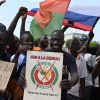By: Breanna Edwards
498788632-demonstrators-confront-police-during-a-protest-over-the
Demonstrators confront police during a protest over the death of Laquan McDonald on Nov. 25, 2015, in Chicago.
Federal prosecutors declined to bring charges against U.S. law-enforcement officers in a majority of cases involving charges of civil rights violations between 1995 and 2015, an investigation by the Pittsburgh Tribune-Review has revealed.
The newspaper reportedly delved into almost 3 million records from the Department of Justice related to how the 94 U.S. attorney’s offices across the country and U.S. territories dealt with civil rights cases against law enforcement. It was discovered that prosecutors turned down some 12,703 potential civil rights violations out of 13,233 complaints—about 96 percent in all, Reuters notes. Only about 23 percent of referrals in all other types of criminal cases were rejected, however.
The Tribune-Review points to the difficulty of prosecuting civil rights cases against officers, since it can be hard to determine what anyone intended or meant to do, even with a video of the incident. Federal prosecutors have to prove that an officer acted “willfully” in a civil rights case rather than just negligently or recklessly, Reuters notes.
“When you take sort of a loosely defined accidental encounter at a traffic stop … it’s very difficult starting at that point to get over the intent requirement we face under that statute,” University of Chicago law professor Craig Futterman told the Tribune-Review. “It was really built for a time when someone went out with a specific intent to do someone harm.”















